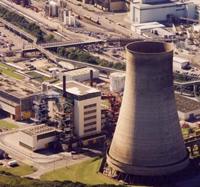|
Germany's government today said that all the country's nuclear power plants would be shut down by 2022, making it the only nuclear power producing country to officially go nuclear-free since the Japanese disaster.  Nuclear plants produce a quarter of Germany's electricity, and the coalition government's agreement to shut them down is seen as risky by some observers; but it is expected to put the country at the forefront of conversion to renewable energy sources. Nuclear plants produce a quarter of Germany's electricity, and the coalition government's agreement to shut them down is seen as risky by some observers; but it is expected to put the country at the forefront of conversion to renewable energy sources.
Chancellor Angela Merkel said after the move was announced, ''To generate the electricity of the future we need to give our energy system an entirely new architecture.'' India meanwhile is going ahead with its plan to build what will be the world's biggest nuclear plant, despite massive local and environmental protests at the plant site. Going by international trends, there are unlikely to be new contenders for the Jaitapur plant's title of 'world's biggest' in future. Germany has 17 nuclear plants, of which eight will be switched off this year. The country's seven oldest reactors already taken off the grid pending safety inspections following the catastrophe at Japan's Fukushima nuclear power plant in March will remain offline permanently, environment minister Norbert Roettgen said. Roettgen praised the coalition agreement after negotiations through the night between the governing parties. "This is coherent. It is clear," he told reporters in Berlin. "That's why it is a good result." The decision by Angela Merkel's Christian Democrats and their coalition partner the Free Democrats will come as a blow to Germany's ''big four'' nuclear power companies, RWE, Eon, Vattenfall and EnBW . The German government will not abolish a nuclear fuel-rod tax introduced this year to facilitate the switch to renewable energy – even though the quick closure of the first group of plants is expected to reduce the power generators' annual tax bill by almost 50 per cent. Chancellor Angela Merkel pushed through measures in 2010 to extend the lifespan of the country's 17 reactors, with the last one scheduled to go offline in 2036, but she reversed her policy in the wake of the Japanese disaster. Germany, Europe's biggest economy, prides itself on being at the forefront of renewable energy use among the rich countries. Italy decided to stop producing nuclear power after the 1986 Chernobyl disaster. The government of neighbouring Switzerland, where nuclear power produces as much 40 per cent of the country's electricity, also announced last week that it plans to shut down its reactors gradually once they reach their average lifespan of 50 years - which would mean taking the last plant off the grid in 2034. Energy from wind, solar and hydroelectric power currently produces about 17 per cent of Germany's electricity, but the government aims to boost that to around 50 per cent in the coming decades. The coalition government's decision broadly follows the conclusions of a government-mandated commission on the ethics of nuclear power, which delivered its recommendation to abolish the technology by 2022 on Saturday. Details of the final report are to be presented later today.
|